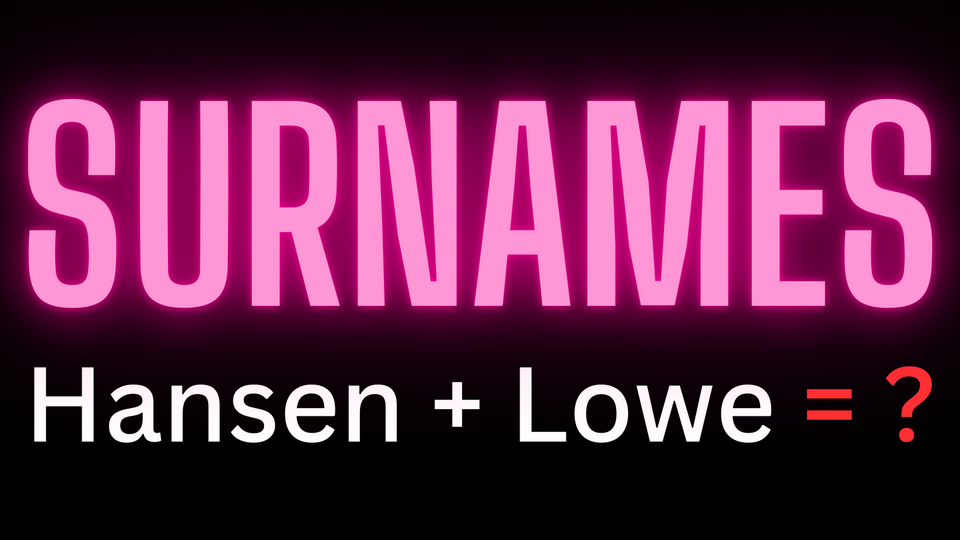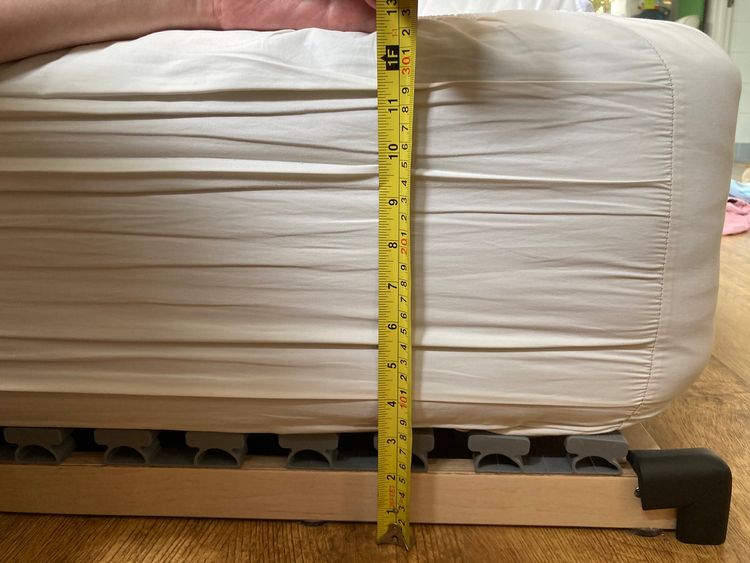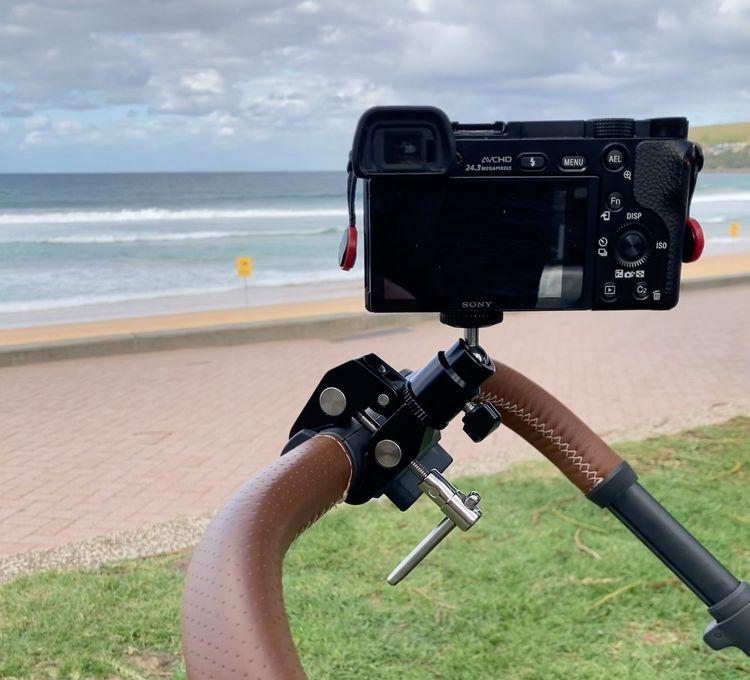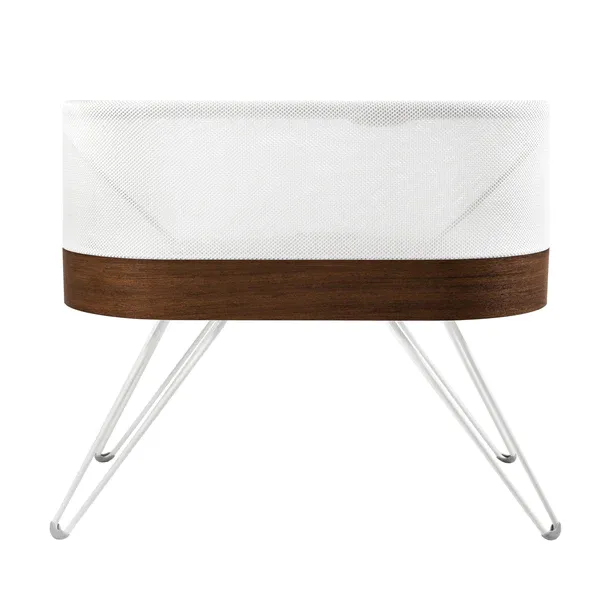Choosing a Portmanteau/Blended Baby Surname

My partner & I recently had a baby. As part of having a baby, the state of New South Wales demands you name them, with (at least) a first name and a surname. First names are mostly anything-goes, but surnames present difficult tradeoffs around gender equality, recognition of history, convention, social ease, verbosity, convenience, spelling, stigma, future-proofing, and the politics of parents and grandparents.
We eventually decided on a portmanteau surname for our child. Here's how.
Background: Surname History
It's complex. Surnames were usually mandated by state bureaucrats, to help disambiguate citizens, making it easier to tax and conscript them.
My surname (Hansen) started as a patronym (son-of-Hans); when my great-great-great-grandfather Hans Peterson had a child Hans Roby Hansen, sometime in the 1800s. This became a permanent/fixed patrilineal name sometime around Denmark's mid-1800s naming laws, passing down to children who's father was not Hans. European nobility had long used surnames to indicate legitimacy of children, but mandatory European commoner surnames are relatively recent: many countries only required surnames from the 1800s.
My partner's surname "Lowe" is an Anglicised version of the Cantonese "Lau", which traces back at least hundreds of years. Her parents' generation chose the Anglo-Saxon-sounding "Lowe" when immigrating to Australia, likely to reduce the racism their family would face. China, with its strong bureaucratic central government, has had widespread surnames for thousands of years.
Both names have significant history for us. But, so do our mother's maiden names, and we don't carry those. We can recognise history without carrying a surname. Genealogy is getting easier with better record-keeping, even without matching surnames.
Surname Options
We weren't sure what to do. We wanted to be intentional about choosing a name, not just "go with the default".
I didn't really like the patriarchy of choosing my surname over my partner's. I was a little worried about "giving up the history" of my name and choosing my partner's surname. Double-barrelled names are getting more popular. "Lowe-Hansen" rolls off the tongue nicely (like Johansen), but both our names have spelling difficulty, with "e"s that you always have to spell out over the phone; would our child resent spelling out "Lowe-Hansen" for the rest of their life?
I read some interviews on the Feminist Last Naming Practices Project. And I was grateful to find a book that explores the topic, by an Australia-based author:

The book explores the tradeoffs by interviewing parents who have chosen from the following options:
- Father's surname
- Mother's surname
- Hyphenation, or a double-barrelled surname (without a hyphen)
- Alternating the two parents' surnames between siblings
- Combining the two surnames into a portmanteau or blended surname
- Making up a completely new surname
All present tradeoffs, there's no right or wrong answer.
A Portmanteau/Blend?
It was tempting. We'd heard rumours of portmanteau names. But didn't know anyone that had actually done it. Lowe + Hansen... "Hanslow"? "Lohan"?
We initially discounted it as too "out there". But we kept thinking about it. The interviews in the book with happy parents who'd chosen it made us more confident we'd be happy with one.
The book helped mitigate our main concerns: trouble at borders? Not really, and if there is ever any, show the birth certificate. Are there other bureaucratic challenges? Not really, apparently. It's pretty common for children to have different names from their parents anyway, with divorces and combined families. Systems generally already have to handle this.
A Tool for Finding Portmanteau Surnames
There are surname-history websites, and portmanteau-search websites. But no surname-portmanteau-search websites. So I made my own.
I looked for a dataset of surnames – although we could choose any word, probably limiting it to 'actual surnames' seemed like a reasonable place to start. The most detailed surname dataset I could find was the US Census' list of surnames with over 100 occurrences: 162,254 surnames.
I loaded this into a Jupyter Notebook. I put the code online into a Colab Notebook so you can copy and edit the code in-browser.
import io
import pandas as pd
import requests
import zipfile
r = requests.get("https://www2.census.gov/topics/genealogy/2010surnames/names.zip")
with zipfile.ZipFile(io.BytesIO(r.content)) as z:
with z.open("Names_2010Census.csv") as f:
df = pd.read_csv(f, na_filter=False)
dfFirst looking at anagrams: with all characters drawn from our names:
def anagram(s):
return all([c in "HANSEN LOWE" for c in s])
df[df["name"].map(anagram)]This didn't work well. It kept giving options with letters drawn from just one of our names (e.g. LEE, HESS). So I constrained it to require at least two characters from each person's name:
def anagram(s):
return (all([c in "HANSENLOWE " for c in s])
and sum([c in "HANSEN " for c in s]) > 2
and sum([c in "LOWE " for c in s]) > 2)
df[df["name"].map(anagram)]The results weren't great: ALLEN, NELSON, OWENS, LAWSON, OLSEN... these didn't really feel like a blend of our names.
So I tried another approach, looking for names that had some part of each of our names:
def bits(s):
return ("LO" in s or "LAU" in s) and ("HAN" in s or "SEN" in s)
df[df["name"].map(bits)]This turned up much better options with a blended sound: HARLOW (fun?), HANLON (of razor fame?), HALLOWELL (that's a lot of L's), HALLOWAY (if you think of my partner's name as pronounced Lowé it almost makes sense), SHALLOW (hmm, not sure of the implications), HALLOW/HALLOWS (fun, but sounds like a greeting), LOHAN, HANSELL.
Copy and edit the notebook online.
Using the code, we didn't find any names we liked more than the initial guesses of Lohan and Hanslow. But the process reassured me that we weren't missing a better option.
Lock it in
We tried-out the name Lohan for a week. It felt good. Easy to spell, easy to say.
It feels egalitarian: half of my name, half of my partner's name. While I get more letters of my name in (3 letters to 2), my partner gets the whole pronounced syllable of her name in.
It removes our surname's hard-to-spell suffixes. It's a mix, just like the baby is. It has Celtic history, just like I do.
We put Lohan on the birth registration, and the state of New South Wales was happy to ink it on the birth certificate.
The parent's surnames haven't changed: we didn't think "having the same surname" is very important for family cohesion.
I'm glad that we have this choice. We found a name that's true to our values. Blended surnames are a real option.




Comments ()